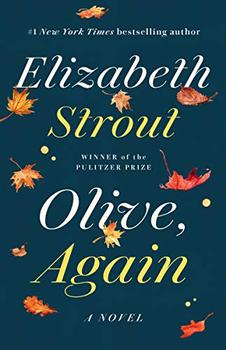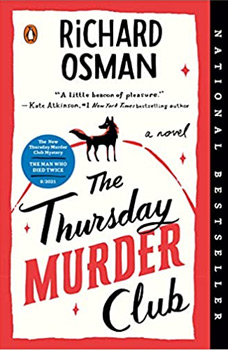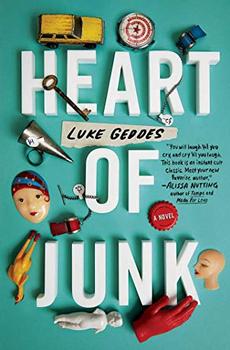Summary | Excerpt | Reading Guide | Reviews | Beyond the book | Read-Alikes | Genres & Themes | Author Bio

A Novel
by Elizabeth StroutVoted 2019 Best Fiction Award Winner by BookBrowse Subscribers
2019 was a big year for literary sequels, with the publications of Find Me by André Aciman, The Testaments by Margaret Atwood and Olive, Again by Elizabeth Strout. In all three cases, readers have had to wait more than a decade to return to a familiar setting and set of characters—but in the meantime there has been a film or television adaptation to tide them over. It was 11 years ago that we first met Olive Kitteridge, a grumpy retired math teacher in the fictional town of Crosby, Maine, through the Pulitzer Prize-winning Olive Kitteridge (2008).
Like several of Strout's novels, this sequel is a collection of linked short stories. The stories are connected by the Maine setting and by references to Olive, who is often the main character but sometimes only mentioned in passing, such as through a piece of advice she gave her math students several decades ago, or a brief encounter with a local acquaintance. All is not cozy in this small town; Crosby's residents are struggling with illness, addiction, dementia, domestic violence, poverty and ailing marriages. Yet Strout balances out tragedy with humor, as in "The End of the Civil War Days," a story about a husband and wife who have barely spoken in 35 years—they even divided their house down the middle with yellow duct tape—but are reunited by their mutual dismay about their daughter's unconventional career choice.
If it's been years since you've read Olive Kitteridge, you may want to reread its final story, "River," as the sequel picks up immediately where this one left off. (That said, Strout provides enough background information that familiarity with the first book is not an absolute requirement.) After her pharmacist husband Henry dies in a nursing home following a stroke, Olive entertains the prospect of a romance with widower Jack Kennison. The challenge of adjusting to a second marriage with someone who exasperates you is a major theme of Olive, Again. For starters, Jack is a Republican, while Olive is an outspoken Democrat. "God, Olive, you're a difficult woman," Jack exclaims just before he proposes. Although he wishes she "could be a little less Olive," he is sure they should get married—"Because I love you," he says, "and we don't have much time."
As Olive drifts from her 70s into her 80s, the ravages of old age become inescapable. She faces the return of widowhood—along with infirmity and the specter of death—with her usual mixture of stoicism and bad temper. You may hear more about her bowels than you'd like, but Strout, it seems, is determined to be realistic about the indignities of aging. Crucially, Olive has started, very late in life, to have compassion for others, including her daughter-in-law and the caregivers she meets after her heart attack. "Tell me what it's like to be you," she requests of her Somali nurse; "You're having a hell of a time," she says to a former student with cancer. Comparing other people's lives with her own, she realizes how lucky she's been. Yet somehow that doesn't make preparing for death any easier.
Besides Olive Kitteridge, there are references to a couple of other Strout novels. In the story "Exiles," Bob and Jim Burgess of The Burgess Boys (2013) are reunited in Maine, while in the final piece, "Friend," Olive befriends a new fellow nursing home resident, who turns out to be Isabelle Daignault of Amy and Isabelle (1998). The connections, not just between the Olive stories, but also across Strout's various novels, are satisfying; readers who are reasonably new to Strout will undoubtedly be compelled to seek out her other work.
Older characters are still fairly rare in literature (see Beyond the Book), so it's refreshing to encounter a protagonist in her 80s. Crosby feels like a microcosm of modern society, with Olive as our Everywoman guide. She hasn't lost her faculties or her spirit, but the approach of death lends added poignancy to her story. "I am scared to death to die, is the truth," she tells a former student. Nor has she figured it all out by the end of the book: "I do not have a clue who I have been. Truthfully, I do not understand a thing," she thinks. Haven't we all felt the same at some point? Strout is a master of psychological acuity and mixing hope with the darkness. Those who are wary of sequels need not fear: Olive, Again is even better than Olive Kitteridge, and one of the most profound and worthwhile books of the year.
![]() This review was originally published in The BookBrowse Review in December 2019, and has been updated for the
November 2020 edition.
Click here to go to this issue.
This review was originally published in The BookBrowse Review in December 2019, and has been updated for the
November 2020 edition.
Click here to go to this issue.

If you liked Olive, Again, try these:

by Richard Osman
Published 2021
Four septuagenarians with a few tricks up their sleeves
A female cop with her first big case
A brutal murder
Welcome to...
THE THURSDAY MURDER CLUB

by Luke Geddes
Published 2021
A hilarious debut novel about an eclectic group of merchants at a Kansas antique mall who become implicated in the kidnapping of a local beauty pageant star.
Your guide toexceptional books
BookBrowse seeks out and recommends the best in contemporary fiction and nonfiction—books that not only engage and entertain but also deepen our understanding of ourselves and the world around us.